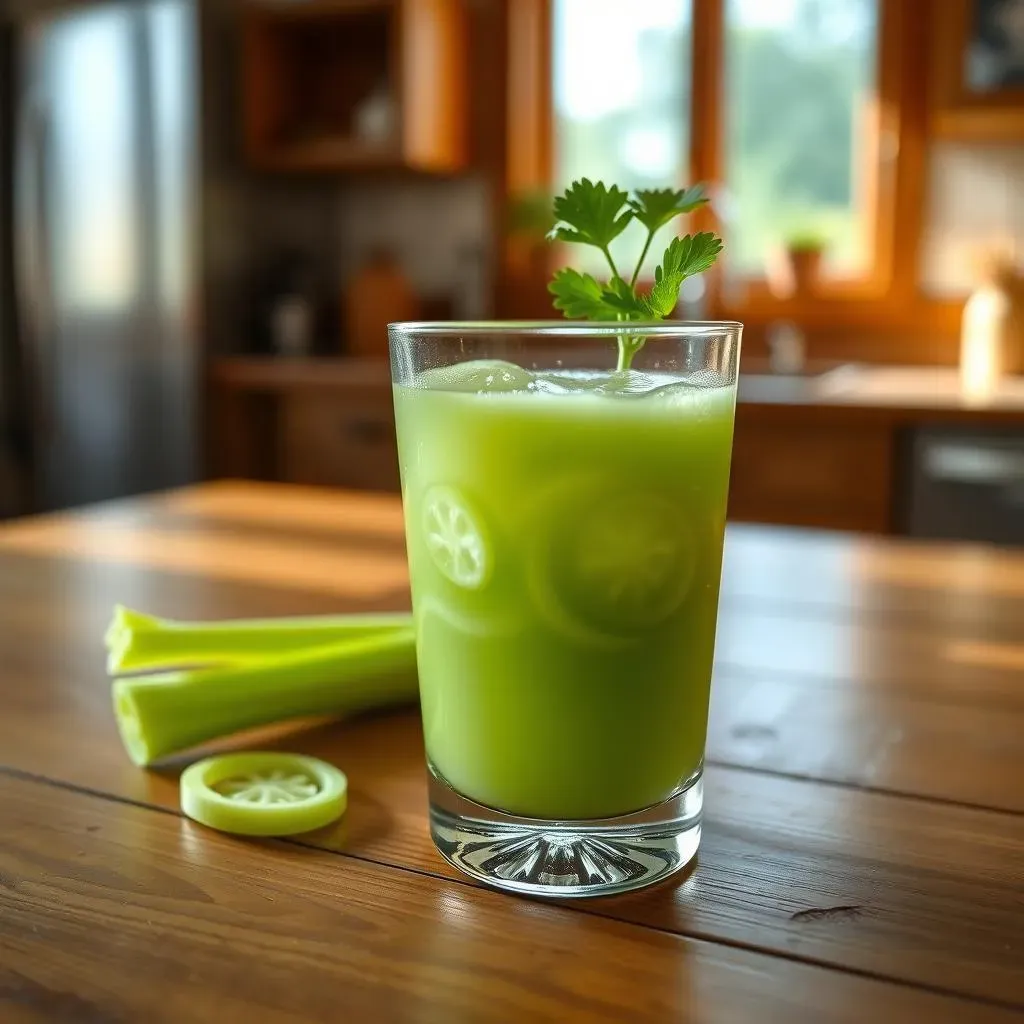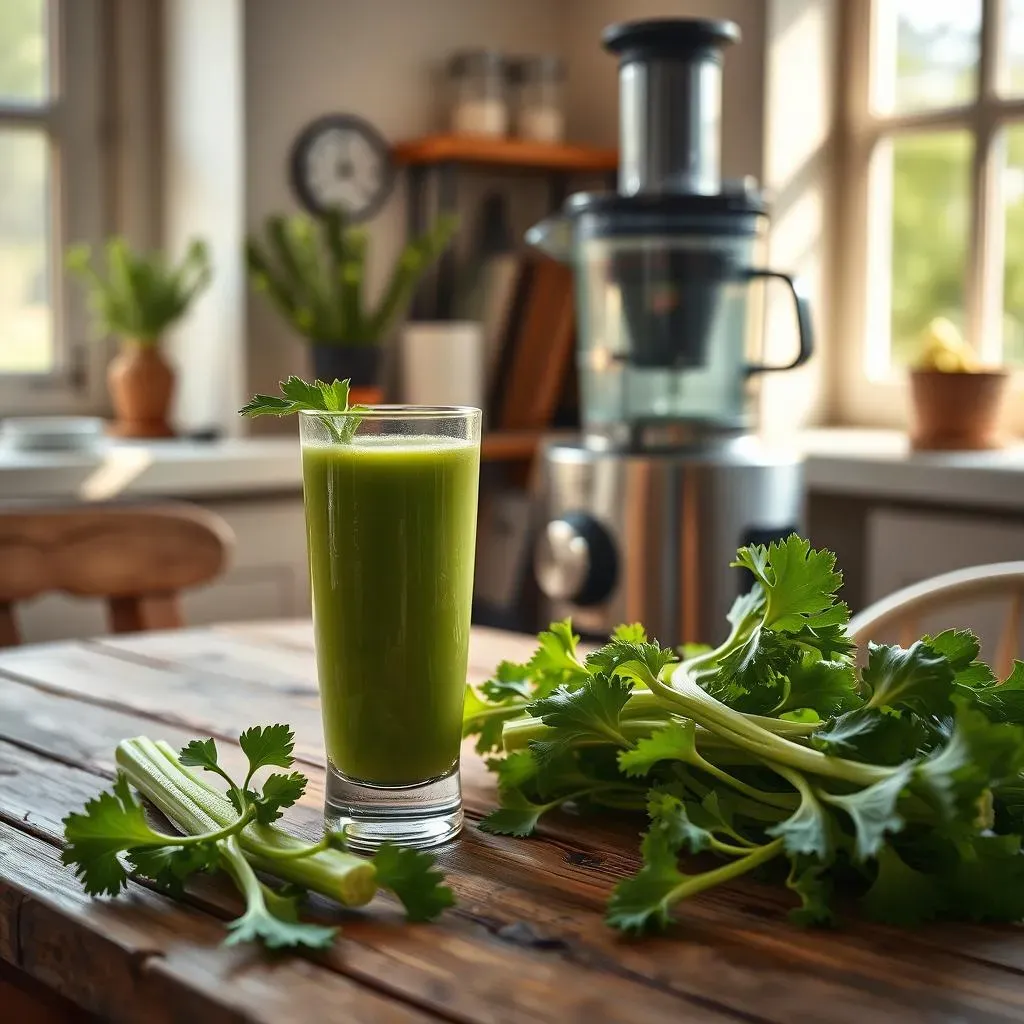Table of Contents
You've probably seen the green juice flooding your social media feeds, touted as a miracle cure. Yes, I'm talking about celery juice. This vibrant drink has been making waves, with many claiming it can detox your body, clear your skin, and even help you lose weight. But is there any truth to all the hype surrounding celery juice detox effects? Or is it just another health fad that'll fade away? In this article, we're going to cut through the noise and take a closer look at the science—or lack thereof—behind the claims. We'll explore what a celery juice cleanse actually entails, examine the potential benefits and risks, and discuss how to make it yourself if you're curious. So, before you jump on the celery juice bandwagon, stick with me, and let's find out if this green drink is a friend or foe to your health.
What's the Deal with Celery Juice Cleanses?

What's the Deal with Celery Juice Cleanses?
Alright, so you've heard the buzz about celery juice cleanses, right? It's like this bright green drink suddenly became the wellness world's darling. People are saying it's a magic potion for everything from clearing up your skin to helping you drop some pounds. The basic idea is pretty simple: you drink a whole bunch of celery juice, usually on an empty stomach, and that's supposed to "detox" your body. Some folks are doing it for a few days, others for weeks, and some even make it a daily thing. But here's the thing: our bodies already have built-in systems, like our liver and kidneys, that do a pretty good job of cleaning house. So, the question isn't whether we need to detox, but if this particular method is all it's cracked up to be.
Celery Juice Detox: Potential Benefits and Risks

Celery Juice Detox: Potential Benefits and Risks
The Allure of Celery Juice: What's the Good Stuff?
Okay, so let's talk about why some people are so hyped about celery juice. They often say it's packed with vitamins, like A, C, and K, and minerals like potassium. Celery also has these things called phytonutrients, which are like little superheroes that can help reduce inflammation in your body. Some early studies suggest that celery might help lower blood pressure and cholesterol, which is pretty cool. It's also low in sugar, which is a plus if you're trying to cut back on the sweet stuff. And of course, it's hydrating, because it's mostly water. So, yeah, there's some good stuff in celery, no doubt about it.
But here's the thing, juicing takes away a lot of the fiber, and fiber is super important for your gut health and makes you feel full. So, while you're getting some vitamins and minerals, you're also losing out on some other beneficial parts of the celery. Plus, the amount of these nutrients in a single glass of juice might not be as much as you'd get from eating a whole bunch of veggies throughout the day.
The Not-So-Pretty Side: Potential Risks
Now, let's get real about the potential downsides. First off, some people can have allergic reactions to celery, and that's not something to mess with. You might get itchy, have a rash, or even have trouble breathing, so if you've never had celery before, start with a small amount. Then, there's the "detox" effect. Some people report digestive issues, like bloating, gas, or even diarrhea when they start drinking a lot of celery juice. This is because it's changing the balance of bacteria in your gut, and that can be a bit of a shock to your system. Also, celery contains compounds called oxalates, and if you have kidney problems, drinking too much celery juice could potentially make things worse.
And here's a big one: celery juice cleanses are often very low in calories. If you're only drinking celery juice for an extended period, you're not getting enough protein, healthy fats, and other important nutrients your body needs. This can lead to fatigue, muscle loss, and even mess with your hormones. Plus, there's no real evidence that these cleanses actually "detox" anything. Your body is pretty good at doing that on its own. And honestly, some people can develop really unhealthy eating habits when they try to restrict their diets like this.
Potential Benefits | Potential Risks |
|---|---|
Vitamins A, C, K | Allergic reactions |
Minerals like potassium | Digestive issues (bloating, gas, diarrhea) |
Phytonutrients (anti-inflammatory) | Kidney problems (oxalates) |
Hydration | Low calorie intake, nutrient deficiencies |
May help lower blood pressure and cholesterol | Unhealthy eating habits |
Making Celery Juice: What You Need to Know

Making Celery Juice: What You Need to Know
The Basics: Getting Started
Okay, so you're thinking of making your own celery juice, huh? It's not rocket science, I promise. First things first, you'll need celery, obviously. Grab a bunch, and make sure it's nice and fresh, with firm stalks and bright green leaves. Wash it thoroughly to get rid of any dirt or pesticides. Now, you have a choice: you can use a juicer if you have one, or you can use a blender. A juicer will give you a smoother juice, but a blender works just fine too, especially if you don't mind a little pulp.
Juicer vs. Blender: The Showdown
If you're using a juicer, it's pretty straightforward: just feed the celery stalks through, and let the machine do its thing. If you're going the blender route, you'll need to chop the celery into smaller pieces and add some water to help it blend. Start with about half a cup and add more as needed to get the consistency you want. Once it's blended, you'll need to strain out the pulp using a cheesecloth or a fine-mesh sieve. This can be a bit messy, but it's worth it for that smooth, sippable juice. Either way, aim for about 16 ounces of juice, which is a decent serving size.
Method | Pros | Cons |
|---|---|---|
Juicer | Smoother juice, less pulp | Requires a juicer, can be more expensive |
Blender | More affordable, uses whole celery | Requires straining, may have more pulp |
Tips and Tricks for Best Results
Now, for some pro tips! It's best to drink your celery juice right away, within 15 to 20 minutes of making it, to get the most nutrients. Some people swear by drinking it on an empty stomach first thing in the morning, about 30 minutes before eating anything else. But honestly, just do what works best for you and your schedule. If you find the taste a bit strong on its own, you can add a squeeze of lemon or lime. But try not to add other fruits or sweeteners, as they can change the way your body absorbs the celery juice. And remember, consistency is key. If you're going to try this, stick with it for a few weeks and see how you feel. But always listen to your body, and stop if anything feels off.